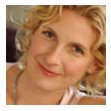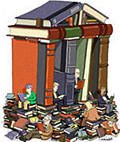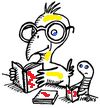 Do we have to love a book's main character? What happens if we despise the hero/heroine?
Do we have to love a book's main character? What happens if we despise the hero/heroine?
I just read a blurb for Zoe Heller's new book, Believers. Critics are praising it up and down, though some find the characters unlikable ... can’t relate to them ... even find them NASTY!
So, back to my question. Can we enjoy a book without liking its characters? Love the book, hate her—as in Serena, another recent book with a heroine no one can stand.
How about Emma—Jane Austen’s masterpiece? Even Austen knew her dear readers would have trouble liking her control-freak-of-a-heroine. Then there's Lolita, featuring one of the most dastardly heroes in all of literature? Humbert Humbert is surely enduring if not endearing—and the book is considered one of the great works of the 20th century.
Still ... it’s hard to get into a book when characters are unlikable. Am I alone? Probably not.
Questions for Book Clubs
- Can a bad character ruin a good book?
- How do you begin most of your book discussions—by talking about the characters? And if you don’t like the main character...where does the discussion go? Does it peter out?
- If a character is unlikable, is it intentional on the part of the author? To what end?
 So pretty. So Blonde. So articulate. Did I mention thin? On top of that, she writes Eat, Pray, Love, a terrific besteller. (Me? I’d have called it Eat, Eat, Eat…but then it’s her book, and as I said, she’s thin.)
So pretty. So Blonde. So articulate. Did I mention thin? On top of that, she writes Eat, Pray, Love, a terrific besteller. (Me? I’d have called it Eat, Eat, Eat…but then it’s her book, and as I said, she’s thin.)
I ran across her on a video interview on the "Barnes & Noble Studio" page, Meet the Authors. It’s fun place to visit—good interviews with interesting authors.
Also check out Borders Book Club, another set of videos featuring an Ann Arbor, Michigan, book club that invites top authors in to speak.
Book Clubs can get some good ideas of books to read, authors to check out, discussion questions to ask. The videos are interesting enough to play in your meetings.
 Two good articles appeared recently about re-reading. Roger Angell of The New Yorker and Verlyn Klinkenborg of The New York Times both talk about the joys of returning to favorite books.
Two good articles appeared recently about re-reading. Roger Angell of The New Yorker and Verlyn Klinkenborg of The New York Times both talk about the joys of returning to favorite books.
Here’s Verlyn (we’re on a first-name basis, at least I am):
Part of the fun of re-reading is that you are no longer bothered by the business of finding out what happens.... I’m able to pay attention to what’s really happening in the language itself—a pleasure surely as great as discovering who marries whom, and who dies, and who does not. (The New York Times 5/29/09)
For Book Clubs
Use part of a meeting to talk about books any of you have re-read—and why (why re-read and why that book?). Was re-reading a different experience—more interesting, or less? Have you read any book more than twice, thrice...?
 Janet is one of those wonderful occurrences of the 21st century—an internet friend. Her blog, Riehl Life, continually demonstrates a love of life’s gifts. And Janet has a gift of her own: a talent for poetry and ear for music.
Janet is one of those wonderful occurrences of the 21st century—an internet friend. Her blog, Riehl Life, continually demonstrates a love of life’s gifts. And Janet has a gift of her own: a talent for poetry and ear for music.
I’ve invited Janet here to talk about the two projects in The Sightlines Collection: her book Sightlines: a Poet’s Diary and now a new CD, Sightlines: A Family Love Story in Poetry and Music, which brings in music by her 93-year-old father along with his family stories and banter at the recording session in his parlor.
So here’s Janet—
Molly: Janet, tell us what inspired you to produce The Sightlines Collection.
Janet: It covered a three-and-a-half year period. After my sister died in a car crash in August 2004, I began commuting from Northern California back to SW Illinois to our family homeplace. My father and I cared for my mother there. It was a hard time. But, out of the truth I found there, I wrote Sightlines: A Poet’s Diary.
My birthday is at the end of the year. I went into a small retreat where I received a clear leading that I needed to listen to the truth and meaning of this period in my life…and write a book to help others. When I returned to my parents’ place after this, I began the book. It flowed out in the form of story poems. This was an easy and effective way to tell my story. This form also provided a good way to make the story accessible, even to readers who weren’t keen on poetry.
After its publication, I gave talks and workshops in the Midwest and West to get the word out. Folks told me that hearing me read these poems added so much meaning to them. Several people suggested that I record them. I’d had this in mind for several years, but didn’t know how to proceed. In Spring 2008 I’d planned to visit two of my closest blogging buddies in Nashville. Suddenly, it occurred to me that the time had come for me to make the audio book.
Indeed, it had! One of my buddies—Yvonne Perry—suggested Scott Kidd, her son-in-law as my sound engineer. Suddenly, we were on the way. The music was recorded in my father’s parlor, and I recorded the 90 poems in Scott’s home studio. It took us eight months to produce, but moved smoothly the whole way.
Molly: Any tips for our book club members?
Janet: Yes. When preparing for the book club, use the Sightlines Collection as a package. Read the book while listening to the audio book. Taking in the material through both your eyes and ears leads even more directly to your heart. At the meeting queue up tracks on the audio book to enhance and deepen your discussion.
Molly:
Here are a few tips of my own:
1. First of all, to purchase Janet’s Sightlines (the print only version) go here: iUniverse. Buy the new CD version here: CD Baby
2. To learn more about Janet and her collection, check out our Reading Guide for Sightlines.
3. Download the delicious recipe for scrapple that Janet and her father have kindly provided. It would be fun to serve at a meeting devoted to Sightlines.
 I did a post recently on the pleasures of re-reading. I want to add an addendum to that post (original post, June 21, 2009).
I did a post recently on the pleasures of re-reading. I want to add an addendum to that post (original post, June 21, 2009).
My friend, Randy Minnich, is a great re-reader…maybe obsessively so. See what you think—he’s read Tolkein’s Lord of the Rings series . . . 20 times. Actually, more like 22.
Of course, you’re wondering about the movie. What did he think of Peter Smith’s adaptation? Couldn’t sit through it. It would have ruined an entire world of his private imagining, he told me.
But wait… there’s more! Randy’s also read Patrick O’Brian’s Master and Commander series, all 24 volumes . . . get this: 8 times. (If you’re doing the math, it’s 192 books .) Like Tolkein, this was done over a period of decades.
Anyone top that? Randy was a research chemist. Does that explain it? (Nah…don’t think.)
